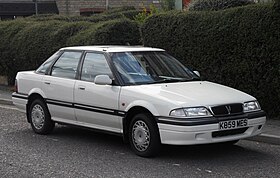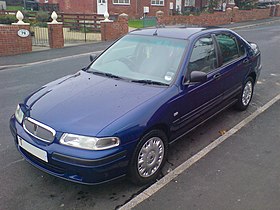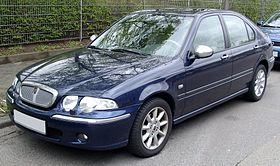Rover 45
| Rover 400 Series Rover 45 |
|
|---|---|
 |
|
| Overview | |
| Manufacturer | Rover |
| Production | 1990–2005 |
| Assembly | United Kingdom: Longbridge, Birmingham |
| Body and chassis | |
| Class | Small family car |
| Layout | Front-engine, front-wheel-drive |
| Chronology | |
| Predecessor | Rover 200 (SD3) |
| Rover 400 (R8) | |
|---|---|
 |
|
| Overview | |
| Production | 1990–1995 (saloon) 1993–1998 (estate) |
| Body and chassis | |
| Body style | 4-door saloon 5-door estate |
| Related |
Honda Concerto Rover 200 (R8) |
| Powertrain | |
| Engine | 1.4 L K-Series I4 (petrol) 1.6 L I4 (petrol) 2.0 L M-Series I4 (petrol) 1.8 L PSA XUD I4 (t/c diesel) 1.9 L PSA XUD I4 (diesel) |
| Dimensions | |
| Wheelbase | 2,550 mm (100.4 in) |
| Length | 4,370 mm (172.0 in) |
| Width | 1,680 mm (66.1 in) |
| Height | 1,400 mm (55.1 in) |
| Rover 400 (HH-R) | |
|---|---|
 |
|
| Overview | |
| Production | 1995–1999 |
| Body and chassis | |
| Body style | 4-door saloon 5-door hatchback |
| Related |
Honda Domani Rover 200 (R3) |
| Powertrain | |
| Engine | 1.4 L K-Series I4 (petrol) 1.6 L K-Series I4 (petrol) 1.6 L D-Series I4 (petrol) 2.0 L T-Series I4 (petrol) 2.0 L L-Series I4 (t/c diesel) |
| Dimensions | |
| Wheelbase | 2,620 mm (103.1 in) |
| Length | 4,320 mm (170.1 in) |
| Width | 1,695 mm (66.7 in) |
| Height | 1,390 mm (54.7 in) |
| Rover 45 | |
|---|---|
 |
|
| Overview | |
| Production | 1999–2005 |
| Body and chassis | |
| Body style | 4-door saloon 5-door hatchback |
| Related |
Rover 25 MG ZS |
| Powertrain | |
| Engine | 1.4 L K-Series I4 (petrol) 1.6 L K-Series I4 (petrol) 1.8 L K-Series I4 (petrol) 2.0 L KV6 V6 (petrol) 2.0 L L-Series I4 (diesel) |
| Dimensions | |
| Wheelbase | 2,620 mm (103.1 in) |
| Length | 4,360 mm (171.7 in) (1999–2004 hatchback) 4,520 mm (178.0 in) (1999–2004 saloon) 4,386 mm (172.7 in) (2004–2005 hatchback) 4,540 mm (178.7 in) (2004–2005 saloon) |
| Width | 1,695 mm (66.7 in) (1999–2004) 1,678 mm (66.1 in) (2004–2005) |
| Height | 1,390 mm (54.7 in) (1999–2004) 1,386 mm (54.6 in) (2004–2005) |
The Rover 400 Series, and later the Rover 45, are a series of small family cars that were produced by the British manufacturer Rover from 1990 to 2005. The car was mutually developed during Rover's collaboration with Honda; the first-generation 400 was co-developed with the Honda Concerto and the Mk2 400 being based on the Honda Domani/Civic. Honda petrol engines were used in some Rover models, conversely the market competitive Rover L-series diesel engine was used from the mid 1990s in Hondas, before they designed their own diesel engine.
The original 400 Series, launched as a four-door saloon in April 1990, was simply a saloon version of the second-generation Rover 200 Series hatchback, both sharing the codename R8 during development. The 200 Series had been launched six months earlier.
Like the 200, the model was designed in collaboration with Honda (who produced the corresponding designed-for-Europe Concerto model) and both models would share production lines at Rover's Longbridge facility. It used the same core structure and mechanicals as the Honda, but the rear-end redesign of the glasshouse and body were unique to Rover. Interior trim and electrical architecture were all shared with the R8 Rover 200.
An estate—or station wagon—version was subsequently developed by Rover Special Products. Badged as the 'Rover 400 Tourer', this remained in production alongside the second generation 400 until 1998, as no estate version of the later car was built. Many of the 400 Tourers were exported to Japan.
The R8 Rover 200 and 400 were the first applications of Rover's K-Series family of engines (appearing in 1.4 L (1,396 cc) twin-cam 16-valve form). The 1.6 L (1,590 cc) version used either a Honda D16A6 and D16Z2 SOHC or D16A8 DOHC powerplant, while the 2.0 L M-Series unit from the 800-series followed soon afterwards (1991) in the sportier versions. The Rover-engined models drove the front wheels via jointly developed Peugeot/Rover R65 gearboxes (1.4 litre) and licence built Honda-designed PG1s for the 1.6 and 2.0-litre versions. The Rover 420 GSI turbo and GSI Sport turbo, produced in limited numbers, were equipped with the turbocharged 197 bhp (147 kW) Rover T-Series engine.
...
Wikipedia
